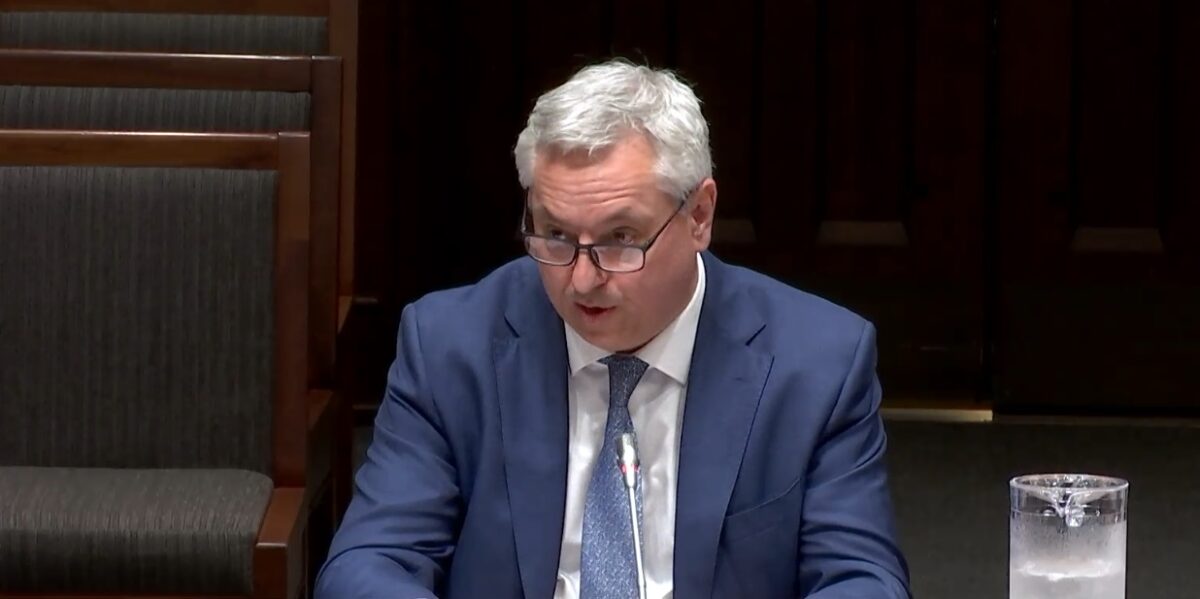The Canadian Association of University Teachers (CAUT) is warning that new research restrictions being imposed by the Canadian government raise serious concerns about racial profiling, academic freedom, and international scientific collaboration.
CAUT executive director David Robinson reacted to the new restrictions announced this January stating “Academics and students of Chinese origin are already being targeted and that is creating a chill on academic research and partnerships.”
Restrictions on research and academic freedom can only be justified in rare cases, must be based on fact and not conjecture, and not “target specific communities,” he stated.
In the most recent CAUT Bulletin, Robinson reiterated his concerns about the new restrictions and also about a recent federal court decision denying a Chinese graduate student a visa to study in Canada because he might become a spy even in the absence of any evidence.
“In reaching its decision, the court drastically expanded the legal definition of espionage,” CAUT’s executive director stated.
Dr. Xiaobei Chen of Carleton University recently filed a complaint with the university in the wake of that institution’s “townhall” in which CSIS and Public Safety Canada addressed faculty members about the new research restrictions. The session led to unsubstantiated accusations being levelled at individuals and ended up cultivating fear and divisions among faculty, according to the complaint.
“I would like to ask what Carleton University is doing to counter this climate of suspicion and to prevent national security overreach that harm faculty and students, especially those of Chinese, Russian, and Iranian backgrounds,” Chen demanded in her written submission.
New Attacks on Academic Freedom
The pushback is in reaction to the New Policy on Sensitive Technology Research and Affiliations of Concern (hereafter New Policy) announced by the ministers of Health, Public Security, and ISEC (Innovation, Science and Economic Development) in January. The policy prohibits research collaboration with Named Research Organizations in Sensitive Technology Research Areas.
The named organizations include a list of over 100 research institutions in China, Iran, and Russia. Those in the People’s Republic of China include well-known institutions such as Beihang University, Beijing Institute of Technology, Chinese Academy of Engineering Physics, Hunan and Sichuan Universities, Nanjing University of Science and Technology, and Tianjin University.
The 11 sensitive research areas are defined as Advanced Digital Infrastructure, Energy, Materials and Manufacturing, Sensing and Surveillance, Weapons, Aerospace, Space and Satellite Technology, Artificial Intelligence and Big Data, Human-Machine Integration, Life Sciences (Biotechnology, Medical, and Healthcare), Quantum Science, and Robotics.
Canadian researchers working in these fields with collaborators “affiliated with, or in receipt of funding or in-kind support” from the targeted organizations will be ineligible for grants from the Canada Foundation for Innovation, the Social Sciences and Humanities Research Council, the Natural Sciences and Engineering Research Council, and the Canadian Institutes of Health Research.
While the list of prohibited organizations claims to be “country agnostic” and “does not target or profile any group of people or country,” this is clearly not the case. Over 80 per cent of the institutions named are in China, with the remainder in Russia or Iran. The list seems to have been cobbled together from similar lists compiled by the Pentagon and conservative think-tanks such as the Australian Strategic Policy Institute without any further justification other than the overseas institutions ‘may pose a risk to Canada’s national security.”
This includes Canadian researchers in medical or healthcare technology that “support good health and prevent, or attempt to prevent, disease” who are now banned from partnering with researchers in the Beijing Institute of Technology undertaking similar research. When the world needs to accelerate research collaboration to enhance planetary health and prevent global pandemics, such measures appear as warlike overreach and counterproductive.
Ironically, one of the named institutions, Tianjin University’s International Center for Nanoparticles and Nanosystems, and the School of Physics, Georgia Institute of Technology in the U.S. recently announced in the journal Nature the joint development of a new type of graphene that is ten times more efficient than silicon as a semiconductor. What is going on?
Canada’s relations with China are already the worst among the G-7. Canadian foreign minister Mélanie Joly has attempted to ameliorate relations, reaching out for a side meeting with China’s Wang Yi at the recent Munich security conference. However, Wang reportedly told Joly to “stop hyping up the ‘China threat’ theory, stop spreading false information about the so-called ‘Chinese interference in Canada’s internal affairs,’ and stop overstretching the concept of national security regarding exchanges in economy and trade as well as science and technology.”
Many Chinese Canadian researchers are already feeling targeted by earlier CSIS-University initiatives. A recent survey undertaken by York University’s Dr. Qiang Zha (forthcoming, Canadian Ethnic Studies) has shown that among researchers familiar with the CSIS guidelines for research, 40 per cent felt “considerable fear and/or anxiety that they were being surveilled by the Canadian government.”
Zha’s research also found that about 20 per cent of Chinese professors have modified their current research projects and limited communications with collaborators in China; one out of ten of all professors surveyed have prematurely or unexpectedly ended or suspended research collaboration with scholars in China over the past three years. Thirty-one per cent of professors who do not have Canadian citizenship are considering leaving Canada because of the climate of fear. These are among the most vulnerable to CSIS’s racializing surveillance.
Universities are already demanding researchers at Canadian universities abide by CSIS lists of ‘high risk’ organizations but can anyone fact check or question the list? Faculty associations are under extreme pressure as threats to academic freedom intensify in the face of changing global landscapes. How to stand up to such challenges is, perhaps, the greatest test ahead.



